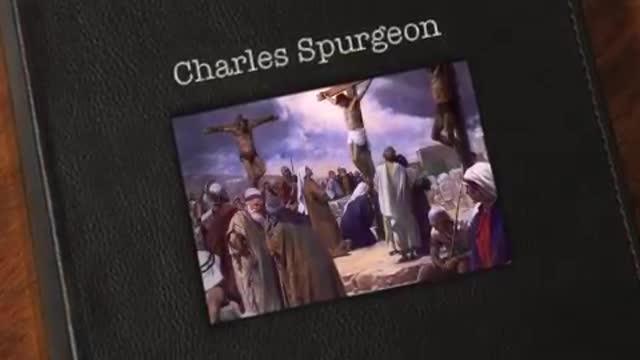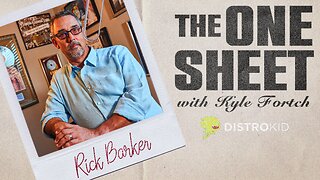Premium Only Content

Morning and Evening December 2nd Ecclesiastes 1:14 Song of Solomon 4:7
"Thou art all fair, my love."
Song of Solomon 4:7
The Lord's admiration of his Church is very wonderful, and his description of her beauty is very glowing. She is not merely fair, but "all fair." He views her in himself, washed in his sin-atoning blood and clothed in his meritorious righteousness, and he considers her to be full of comeliness and beauty. No wonder that such is the case, since it is but his own perfect excellency that he admires; for the holiness, glory, and perfection of his Church are his own glorious garments on the back of his own well-beloved spouse. She is not simply pure, or well-proportioned; she is positively lovely and fair! She has actual merit! Her deformities of sin are removed; but more, she has through her Lord obtained a meritorious righteousness by which an actual beauty is conferred upon her. Believers have a positive righteousness given to them when they become "accepted in the beloved" (Eph. 1:6). Nor is the Church barely lovely, she is superlatively so. Her Lord styles her "Thou fairest among women." She has a real worth and excellence which cannot be rivalled by all the nobility and royalty of the world. If Jesus could exchange his elect bride for all the queens and empresses of earth, or even for the angels in heaven, he would not, for he puts her first and foremost--"fairest among women." Like the moon she far outshines the stars. Nor is this an opinion which he is ashamed of, for he invites all men to hear it. He sets a "behold" before it, a special note of exclamation, inviting and arresting attention. "Behold, thou art fair, my love; behold, thou art fair" (Song of Sol. 4:1). His opinion he publishes abroad even now, and one day from the throne of his glory he will avow the truth of it before the assembled universe. "Come, ye blessed of my Father" (Matt. 25:34), will be his solemn affirmation of the loveliness of his elect.
Evening
"Behold, all is vanity."
Ecclesiastes 1:14
Nothing can satisfy the entire man but the Lord's love and the Lord's own self. Saints have tried to anchor in other roadsteads, but they have been driven out of such fatal refuges. Solomon, the wisest of men, was permitted to make experiments for us all, and to do for us what we must not dare to do for ourselves. Here is his testimony in his own words: "So I was great, and increased more than all that were before me in Jerusalem: also my wisdom remained with me. And whatsoever mine eyes desired I kept not from them, I withheld not my heart from any joy; for my heart rejoiced in all my labour: and this was my portion of all my labour. Then I looked on all the works that my hands had wrought, and on the labour that I had laboured to do: and, behold, all was vanity and vexation of spirit, and there was no profit under the sun." "Vanity of vanities, all is vanity." What! the whole of it vanity? O favoured monarch, is there nothing in all thy wealth? Nothing in that wide dominion reaching from the river even to the sea? Nothing in Palmyra's glorious palaces? Nothing in the house of the forest of Lebanon? In all thy music and dancing, and wine and luxury, is there nothing? "Nothing," he says, "but weariness of spirit." This was his verdict when he had trodden the whole round of pleasure. To embrace our Lord Jesus, to dwell in his love, and be fully assured of union with him--this is all in all. Dear reader, you need not try other forms of life in order to see whether they are better than the Christian's: if you roam the world around, you will see no sights like a sight of the Saviour's face; if you could have all the comforts of life, if you lost your Saviour, you would be wretched; but if you win Christ, then should you rot in a dungeon, you would find it a paradise; should you live in obscurity, or die with famine, you will yet be satisfied with favour and full of the goodness of the Lord.
===
Charles Haddon (C.H.) Spurgeon (19 June 1834 -- 31 January 1892) was a British Particular Baptist preacher who remains highly influential among Christians of different denominations, among whom he is still known as the "Prince of Preachers". He was a strong figure in the Reformed Baptist tradition, defending the Church in agreement with the 1689 London Baptist Confession of Faith understanding, and opposing the liberal and pragmatic theological tendencies in the Church of his day.
Spurgeon was a prolific author of many types of works including sermons, an autobiography, commentaries, books on prayer, devotionals, magazines, poetry, hymns and more.Many sermons were transcribed as he spoke and were translated into many languages during his lifetime. Spurgeon produced powerful sermons of penetrating thought and precise exposition. His oratory skills held throngs of listeners spellbound in the Metropolitan Tabernacle and many Christians have discovered Spurgeon's messages to be among the best in Christian literature.
http://conservativeweasel.blogspot.com/2011/12/daily-devotional-saturday-december-3rd.html
AUAWN1203111
-
 4:06
4:06
Morning and Evening from Spurgeon
3 years ago $0.01 earnedMorning and Evening December 25th Job 1:5 Isaiah 7:14
215 -
 52:36
52:36
The Dan Bongino Show
5 hours agoCutesy Time Is Over (Ep. 2429) - 02/24/2025
1.76M7.91K -
 1:10:46
1:10:46
The Rubin Report
4 hours agoLEAKED: Tense Meeting Details Leaked as MSNBC Lays Off Major Hosts
66.5K122 -
 1:03:25
1:03:25
Timcast
4 hours agoDAN BONGINO Named Deputy FBI Director Under Kash Patel, Deep State & Dem IN PANIC | Timcast LIVE
233K100 -
 2:31:41
2:31:41
Steven Crowder
6 hours ago🔴 Trump Drops a Bombshell: Bongino’s FBI Takeover & Crowder in Germany Exclusive
730K293 -
 1:59:34
1:59:34
LFA TV
1 day agoTIME FOR PAYBACK! | LIVE FROM AMERICA 2.24.25 11AM
115K24 -
![🔴[LIVE TRADING] Bounce or Bust?! || The MK Show](https://1a-1791.com/video/fwe2/ad/s8/1/c/n/q/f/cnqfy.0kob-small-The-MK-Show-Feb.-24th.jpg) DVR
DVR
Matt Kohrs
17 hours ago🔴[LIVE TRADING] Bounce or Bust?! || The MK Show
73.7K3 -
 1:03:25
1:03:25
Kyle Fortch
5 hours ago $2.47 earnedRick Barker: Managing & Developing Taylor Swift, Breaking Artists Today & MORE | THE ONE SHEET S1E5
98.6K1 -
 37:11
37:11
BonginoReport
8 hours agoDan Bongino is Leaving (Ep.146) - 02/24/2025
248K489 -
 2:59:20
2:59:20
Wendy Bell Radio
9 hours agoThe MAGA Diet
182K62